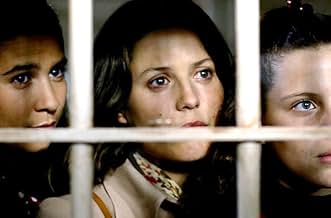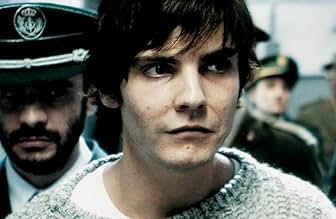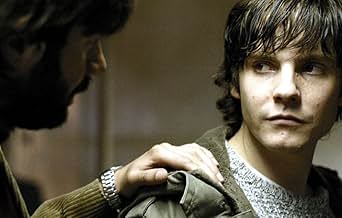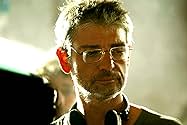Salvador (Puig Antich)
- 2006
- 2h 14min
NOTE IMDb
7,2/10
3,5 k
MA NOTE
Ajouter une intrigue dans votre langueA profile of anarchist and bank-robber Salvador Puig Antich, whose 1974 execution under the dictatorship of Francisco Franco ushered in a period of unrest that helped Spain transition to dem... Tout lireA profile of anarchist and bank-robber Salvador Puig Antich, whose 1974 execution under the dictatorship of Francisco Franco ushered in a period of unrest that helped Spain transition to democracy.A profile of anarchist and bank-robber Salvador Puig Antich, whose 1974 execution under the dictatorship of Francisco Franco ushered in a period of unrest that helped Spain transition to democracy.
- Réalisation
- Scénario
- Casting principal
- Récompenses
- 16 victoires et 22 nominations au total
Biel Duran
- José Luis
- (as Biel Durán)
Avis à la une
Historical memory films often tread difficult ground, and Salvador (Puig Antich) does so with uncommon intensity. From the start, Manuel Huerga applies a powerful visual style that gives weight to the story of the Catalan anarchist executed by the Franco regime in 1974. The film doesn't hold back, throwing us directly into his inevitable fate, but before that, it presents Salvador as a human being-one with ideals, flaws, and a life that was taken away without mercy.
Daniel Brühl delivers an exceptional performance, portraying a character who feels alive even in the quietest moments. His evolution throughout the film is brutal, and when the final moments arrive, the anguish he conveys is difficult to shake off. Huerga's direction is another strong point, though the first section, centered on the heists, has a stylized approach reminiscent of Argentine cinema rather than raw realism. Fortunately, once the film shifts focus to the trial and the days leading up to the execution, everything becomes much more visceral, direct, and devastating.
One of the film's greatest achievements is how it avoids empty idealization or forced nostalgia. There are no one-dimensional heroes or villains here-just a story that hurts because it was real and still echoes today. The script masterfully builds tension, making every scene in the final stretch feel like a punch to the gut.
Despite some questionable aesthetic choices in the opening, Salvador is an incredibly powerful film. It doesn't just retell Puig Antich's story-it does so with a sensitivity and precision rarely seen in Spanish cinema. A sharp, unforgiving dose of reality that leaves its mark.
Daniel Brühl delivers an exceptional performance, portraying a character who feels alive even in the quietest moments. His evolution throughout the film is brutal, and when the final moments arrive, the anguish he conveys is difficult to shake off. Huerga's direction is another strong point, though the first section, centered on the heists, has a stylized approach reminiscent of Argentine cinema rather than raw realism. Fortunately, once the film shifts focus to the trial and the days leading up to the execution, everything becomes much more visceral, direct, and devastating.
One of the film's greatest achievements is how it avoids empty idealization or forced nostalgia. There are no one-dimensional heroes or villains here-just a story that hurts because it was real and still echoes today. The script masterfully builds tension, making every scene in the final stretch feel like a punch to the gut.
Despite some questionable aesthetic choices in the opening, Salvador is an incredibly powerful film. It doesn't just retell Puig Antich's story-it does so with a sensitivity and precision rarely seen in Spanish cinema. A sharp, unforgiving dose of reality that leaves its mark.
I've seen this film today, and although I wouldn't say it's great film wise, I think it's important for people to know about recent history, especially Spaniards. I'm totally against death penalty, and this film has only reassured me in the matter. But I must say the film is somehow partial, as Salvador was in fact a bank robber, no matter what he used the money for. The acting is quite impressive. I must confess I wasn't too convinced about Daniel playing Salvador, as he's German, but he's great. Tristán Ulloa is also very good, and he speaks really good Catalán, sounding native although he's actually Galician (north west Spain). And finally Leonardo Sbaraglia plays an impressive policeman. Incredibly, you forget he's an Argentinian sex symbol and does a really good Spanish accent.Also, I may be a bit impartial myself, since I know the sister of one of Salvador friends in the film and about the family suffer...
I was really caught by the story - a story which I didn't know, and which is hardly known outside Spain and even Catalogne, as the director explained in a festival here in Italy where the film was presented. The last years of life of Salvador Puig Antich, the Spanish anarchic activist, who became the last prisoner of the Franchist regime to be executed. The rhythm is fantastic, energetic and dynamic, thanks to a very suggestive photography and the use of vivid images. The music supports the high tone of the events. The last part involves the spectator in a "crescendo" of emotions, slowing down the rhythm while approaching to the inevitable end. No political claims, no moralistic lessons. A well shot, thrilling, emotional movie!
This movie is in fact two movies. The first one tells Salvador Puig Antich's life. Explains how he became involved in the resistance against Franco dictatorship and his beginnings in the criminal life. This way, the movie doesn't try to make him look like a saint, because he wasn't, and at the same time justifies him somehow, realistically showing the cruelty and repression that take place in the last years of Franco's life.
The other movie tells Salvador's last 12 hours. The relationship with his family, his friends and his enemies. And his cruel execution. This part is 100% Drama, and very well made one. Its almost 45 minutes of holding tears, jumping from a touching scene to a more touching one. Some of the weak points of the first part are finally justified to help this last devastating dramatization.
The main actors make a great job, specially Leonardo Sbaraglia, Daniel Brühl and Tristán Ulloa. Although the last one sounds a little too weird when he talks Catalan. The main problem of the movie is that the plot isn't thick enough. It tells a simple story of a simple boy and don't get to fully explore the characters minds. But it gets close.
The other movie tells Salvador's last 12 hours. The relationship with his family, his friends and his enemies. And his cruel execution. This part is 100% Drama, and very well made one. Its almost 45 minutes of holding tears, jumping from a touching scene to a more touching one. Some of the weak points of the first part are finally justified to help this last devastating dramatization.
The main actors make a great job, specially Leonardo Sbaraglia, Daniel Brühl and Tristán Ulloa. Although the last one sounds a little too weird when he talks Catalan. The main problem of the movie is that the plot isn't thick enough. It tells a simple story of a simple boy and don't get to fully explore the characters minds. But it gets close.
I don't disagree with the view that the subject is quite appropriate for a movie but displays quite gruesome violence, almost senseless for an artistic product. The scenes leading to the execution of the sentence are particularly distressing are particularly lengthy, the sentence itself is really perturbing for such a kind of movie. Other than that the movie is supposed to accurately reflect the violent times around 1970 in the Western World, and hopefully does achieve that target. Have to admit that, however, good acting and good direction are displayed throughout the movie, the main weakness of the movie can be found in the script only.
Le saviez-vous
- AnecdotesManuel Huerga chose Daniel Brühl, whose mother is Spanish, to play Salvador because he didn't want to tell a Spanish story, but a universal drama. This was the first time Brühl filmed in Barcelona, his place of birth.
- Citations
Jesús: They've assassinated Carrero Blanco.
Salvador Puig Antich: That bomb killed me as well.
- ConnexionsEdited from Opération Ogre (1979)
- Bandes originalesI si canto trist
Written by Lluís Llach
Performed by Lluís Llach and Miquel Gil
Arranged by Borja Penalba
Produced by Borja Penalba and Xavi Puig
Meilleurs choix
Connectez-vous pour évaluer et suivre la liste de favoris afin de recevoir des recommandations personnalisées
- How long is Salvador (Puig Antich)?Alimenté par Alexa
Détails
Box-office
- Montant brut mondial
- 3 445 943 $US
- Durée
- 2h 14min(134 min)
- Couleur
- Mixage
- Rapport de forme
- 2.35 : 1
Contribuer à cette page
Suggérer une modification ou ajouter du contenu manquant


































